
Related
Guests
- Monique Hardenco-director of Advocates for Environmental Human Rights and an attorney who specializes in environmental justice concerns in New Orleans.
- John Barryvice president of the Southeast Louisiana Flood Protection Authority–East, the levee board responsible for protecting most of greater New Orleans. He led the authority’s lawsuit against 97 oil and gas companies for destruction of the coastal waterways.
The oil giant BP is back in court for the April 2010 accident that caused the worst offshore oil spill in U.S. history, killing 11 workers and leaking almost five million barrels of crude oil into the Gulf of Mexico. On Monday, the second phase of the trial began with lawyers accusing the oil company of lying about how much oil was leaking, failing to prepare for how to handle the disaster, and for not capping the leak quickly enough. We are joined in New Orleans by Monique Harden, co-director of Advocates for Environmental Human Rights and an attorney who specializes in environmental justice concerns in New Orleans. In the aftermath of the BP spill, Harden’s organization exposed how the oil giant had contracted with a claims processing company that promoted its record of reducing lost dollar payouts for injuries and damage caused by its client companies. We are also joined by John Barry, vice president of the Southeast Louisiana Flood Protection Authority–East, which has brought a lawsuit against 97 oil and gas companies for destruction of the Gulf coastline, making the area more at risk from flooding and storm surges.
Transcript
AMY GOODMAN: We’re in New Orleans. Yes, we are on the road in Louisiana. And our guest today is Monique Harden, environmental lawyer and activist, as we talk about the latest around BP, because it is back in court. That’s right. In looking at a Reuters piece right now: In the frantic days after the 2010 Gulf of Mexico oil spill, BP lied about how much oil was leaking from its Macondo well and took too long to cap it, according to plaintiffs’ lawyers Monday in the opening phase of the second part of this company’s trial. Talk about the significance of this lawsuit that’s now in court, Monique.
MONIQUE HARDEN: Sure. Well, this is the second part of the lawsuit that’s being presided by federal court Judge Carl Barbier. This—the judge has scheduled about a two-week time period to delve into two key issues, which is what happened after the spill occurred—or during the spill, which is the efforts by BP to seal the well and how much oil actually flowed into the Gulf of Mexico. Both of those issues are highly questionable because of the false reporting and data that BP was providing to federal governmental authorities and the press.
AMY GOODMAN: I want to play a clip of Plaquemines Parish Coastal Zone Director P.J. Hahn, who visited some of the area’s shoreline on September 27th, just a few days ago. He shows the BP oil that remains along the marshes more than three years since the spill.
P.J. HAHN: We’re in what’s called Bay Jimmy, one of the hardest areas hit by the BP oil spill. And you can see the amount of oil that’s still left here in the marsh over three years later. Right here you can see the oil that’s just oozing out of these marsh plants. And within this marsh area are small crabs, small crustaceans, that are feeding in this area. The birds come in here, and of course other wildlife like raccoons will come in and feed on these small crustaceans that are covered in this oil, that are also feeding in this area. And, unfortunately, this is one of the most active estuary areas on the planet. [Video courtesy of Julie Dermansky]
AMY GOODMAN: Monique Harden, your response?
MONIQUE HARDEN: Well, this is going to be a problem. The BP spill is going to be a problem that’s going to last for decades. And this—the litigation that’s currently going on is critical in terms of the resources that are exacted or extracted from BP in this case to pay for the repair and the remediation of its damage. We’re talking about a difference between what the Department of Justice would like the court to approve and BP that’s about—the Department of Justice is looking for $18 billion altogether, with its estimate of the barrels of oil spilled into the Gulf. BP is looking for a number under $3 billion. And 80 percent of that money is coming to the five Gulf states that—you know, Texas, Louisiana, Mississippi, Alabama and Florida—for remediation and repair of the damage. So, the—what this case or this part of the oil spill case will result in is, really determines the outcome for these coastal areas of our states.
AMY GOODMAN: So, what has this meant for the community here in New Orleans, Monique?
MONIQUE HARDEN: Well, it means a lot of things in terms of seeing how important our system of governance is to our lives. We have right now a situation where governing authorities have always deferred to companies like BP for the economy and for environmental stewardship. And we see now where that has gotten us, where people are dealing with serious health problems from exposure, as they went out to try to clean up the oil and prevent the spill from coming inland, and without any medical care or real compensation for those injuries that they’ve sustained. Being also economically dislocated, a lot of people are not able to continue the jobs that they had that had been in their families for generations. Some people have actually been displaced by it. They’ve had to look for other places to live and start a whole new way of life all over again. And so, it’s been a real serious hardship for many of our coastal communities. And it’s one that BP needs to be held accountable to.
You know, I think one of the things that’s extremely important for people to understand is that this lawsuit, at the end of the day, is going to generate a number. That number is going to be an amount of money that BP is going to have to pay. What we do with that money is really important, and it’s very difficult right now to ensure that the money will be put into the places where it’s needed the most, and that’s in our coastal communities. And people are trying—are struggling to figure out a way in which they can have a voice in directing in the future where those monies should be spent, that their lives can be restored.
AMY GOODMAN: A recent report by the Center for American Progress found states like Louisiana that receive the most disaster payments also have a large number of lawmakers who are climate deniers, those who doubt the science linking greenhouse gas emissions to higher temperatures and more violent storms. The study found Louisiana has five congressmen who fit this description. One of them is Republican Senator David Vitter, ranking member of the Environment and Public Works Committee. This is Senator Vitter speaking during a hearing in May.
SEN. DAVID VITTER: Climate change is happening. It’s always happening. And there are many significant influences that are making it happen. Just a cursory glance at recent scientific literature shows that influences, major influences on climate, include solar activity, solar cycles, ocean currents, cosmic rays and greenhouse gases that occur naturally, as well as those emitted from many countries, including those who have no plans on regulatory change, like China, India and Russia.
AMY GOODMAN: That is climate change denier David Vitter, the senator from here in Louisiana. Monique Harden?
MONIQUE HARDEN: Well, that’s correct. I’m going to tell a secret that David Vitter would not like many of people in Louisiana to know, which is he’s a Rhodes Scholar. He’s a very smart man, and he knows better. But he’s being paid by oil companies and gas companies, who like things to remain the way they are. And so, denying that climate change exists and is real, has taken the lives of people in Louisiana, separated children from parents, has displaced over a million people after Hurricane Katrina, that we—this is OK. It’s not OK.
One of the things that we’re doing at Advocates for Environmental Human Rights is pooling our resources with groups across the Gulf region to bring together a people’s movement assembly in Mobile, Alabama, at the end of this week, October 4th, and going into Saturday, October 5th. The whole point of that—of this gathering, of this people’s movement assembly, is to make the connection that our communities, we live on the front lines of both the causes and the effects of climate change. We live next to the BP offshore oil drilling, as well as the oil refineries and the petrochemical facilities that are outside many of our homes in our communities in Louisiana, Texas, Mississippi, Alabama and Florida. We also are the first to receive—the first and the worst—the effects of climate change, from storm surge; flooding; intensive, disastrous hurricanes; subsidence even. You know, these are all the effects of climate change that we have. However, the protection of our communities are in the hands of people like Senator Vitter, and it’s up to us, as residents, as constituents, as voters, to change that dynamic. We’ve got to be more in control over how we’re governed in our Gulf region, because our lives and our communities depend on it.
AMY GOODMAN: John Barry, can you talk about how erosion of the coastline affects flooding?
JOHN BARRY: Yeah, I mean, it’s easy. As I said earlier, that land outside the levees protects the levees. It cuts down the storm surge. So the destruction of the coast means you are at greater risk to hurricanes. And that’s, of course, the basis of our lawsuit against 97 of these companies. You know, when they did these operations producing oil and gas, they agreed to maintain and—these canals that they dug at the—you know, without allowing them to erode further. And then, when they were done with them, they were supposed to restore them to their prior case, and they haven’t done that. That’s why we say they are breaking the law. And that increased storm surge is going to be a growing threat. And we have better protection in New Orleans than we’ve ever had, but it’s still the lowest in the developed world. And—
AMY GOODMAN: John, how much of the erosion is due to oil and gas drilling?
JOHN BARRY: Well, it varies from spot to spot, but there was a study by the U.S. Geological Survey a few years ago in which oil industry scientists participated, which concluded statewide it was about 36 percent, which is—in some areas, it’s probably 90 percent; in other areas where there’s no activity, it might be almost zero.
AMY GOODMAN: Monique Harden, can you talk about communities like Mossville?
MONIQUE HARDEN: Well, Mossville is a historic African-American community that is in the midst of 14 toxic industrial facilities, that include the Phillips 66 oil refinery, a coal-fired power plant operated by Entergy, the largest cluster of vinyl production manufactures and a host of chemical production facilities all around this small, historic African-American community.
You know, I think the lawsuit that John and the—Barry, as a member of the Southeast Louisiana Flood Protection Authority, that member, that board, filed is extremely important in terms of bringing these companies to account for the damage that they’ve done. Mossville residents have resolved to do something similar, which is bringing our government, the U.S. government, to account for setting up an environmental permitting system that violates their basic human rights to life, to health, to freedom from racial equality. And what they’ve learned and what we’ve learned as the—representing them in this litigation, is that we can bring our government to account for human rights violations. And this is a case that’s currently pending with the Inter-American Commission on Human Rights. It’s a judicial authority that has jurisdiction over our government for human rights abuses. And they found that the—what we’ve shown taking place in Mossville, which is similar to communities all across the country, where permitting laws disregard basic rights to health, where people are daily exposed to toxic chemicals, that these kinds of laws warrant a review by the Inter-American Commission to make a determination as to what our government should be doing to protect human rights. And right now we’ve got an entire body of laws, a system of laws, for protecting our environment that disregards basic human rights.
AMY GOODMAN: Can you talk about the issue of the environment and race, the issue of environmental justice?
MONIQUE HARDEN: Well, sure. What we find across the United States is that what’s going on in Mossville is part of a large pattern, a national pattern, that has found that some 79 percent of neighborhoods that are predominately African American are also the places where high levels of toxic pollution, dangerous levels of pollution, are released. And this is according to EPA’s own studies, the Environmental Protection Agency’s. Other studies by both governmental and non-governmental organizations show that when it comes to people of color, indigenous peoples, African Americans, Latinos, Asian Americans, Pacific Islanders, where they are predominate in a particular residential community, you will also find toxic hazardous waste facilities and petrochemical operations going on there.
AMY GOODMAN: Mossville named for an ex-slave who founded this community.
MONIQUE HARDEN: That’s right. That’s right. Last name Moss, and the Moss family members of the descendants are still there. Mossville is a really interesting community, because it’s not like a place where people move after five or 10 years. This is a community that has been there, of descendants that have lived there—families who have been there for generations. And so, people who live in Mossville can count back to their founding settlers. The president of Mossville Environmental Action Now, whose name is Dorothy Felix, she talks about being a young child as her father and uncles cut the roads in the area to access the place where they would build the homes, and then, from there, to build the piping and the infrastructure and go on from there. And so, each family has that memory of what it took to settle this place and have a sense of the community that they have, that real value—for the historic value, and also pain over what it has become with the pollution and the industrialization that’s taken place all around them.
AMY GOODMAN: We’re going to have to leave it there, as we head back to New York, but we certainly will not continue—will not stop continuing the story. I want to thank you, Monique Harden—
MONIQUE HARDEN: Thank you.
AMY GOODMAN: —co-director of Advocates for Environmental Human Rights here in New Orleans. And thanks to John Barry, vice president of the Southeast Louisiana Flood Protection Authority–East, author of Rising Tide, lost his bid for renomination Monday because he has led a lawsuit against the oil and gas companies, against 97 of them. Special thanks to SouthWings and the Gulf Restoration [Network], who took Democracy Now!'s Sam Alcoff on an aerial tour of the Gulf. To see that video, you can go to democracynow.org. Also, special thanks to the local crew here in New Orleans public television: Ana Maria Beck and Tom O'Connor, Marina Colorado and Kenny Juneau and Chad Dosher and Donovan Joseph.

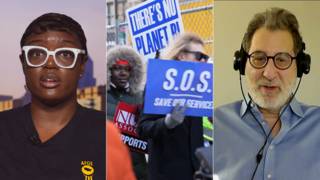
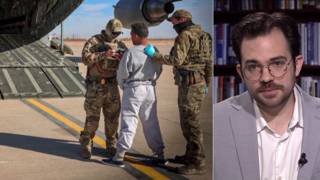
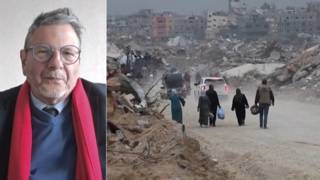





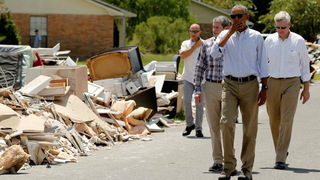
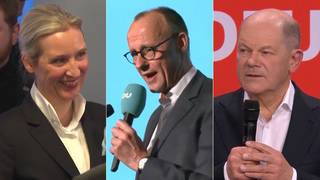
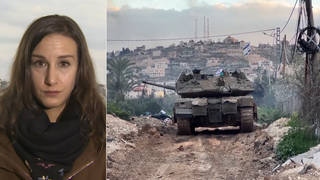
Media Options